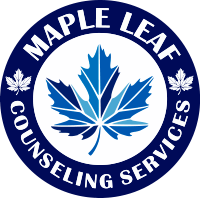Depression is a heavy and often misunderstood topic. Its impact on daily life can be profound, making even the simplest tasks seem insurmountable. Whether you are struggling with depression yourself or know someone who is, help is available. Call 989.220.3060 or contact Maple Leaf Counseling online to learn more about our depression treatment program and take the first step toward improving your mental health today.
The Reality of Living with Depression
According to the DSM V, the umbrella of depression encompasses major depressive disorder and its related mood disorders, including bipolar disorder, postpartum depression, post-traumatic stress syndrome, anxiety disorder, and suicide.1
Depression is more than just feeling sad. It’s a mental health condition that affects how you feel, think, and handle daily activities. Recognizing the symptoms is the first step in understanding and managing depression. Here are some common symptoms:
- Persistent sadness or hopelessness
- Loss of interest in activities once enjoyed
- Changes in appetite or weight
- Difficulty sleeping or oversleeping
- Fatigue or lack of energy
- Difficulty concentrating or making decisions
- Feelings of worthlessness or excessive guilt
- Thoughts of death or suicide
Understanding these symptoms can help in identifying depression early and seeking the necessary help.
Coping with Depression: Strategies for Everyday Life
Dealing with depression is challenging, but there are effective strategies that can make everyday life more manageable. Here are five coping strategies for depression:
1. Establish a Routine
Having a daily routine can provide structure and a sense of normalcy. When every day feels unpredictable, setting a schedule can be grounding. Start with small, simple tasks like:
- Setting a consistent wake-up time
- Planning meals at regular intervals
- Scheduling time for relaxation and hobbies
Creating a routine helps in setting expectations for the day and can reduce feelings of chaos and uncertainty.
2. Practice Mindfulness and Meditation
Mindfulness and meditation are powerful tools for managing depression. They involve focusing on the present moment and accepting it without judgment. Some benefits include:
- Reducing stress and anxiety
- Improving focus and concentration
- Enhancing emotional regulation
Even a few minutes of mindfulness or meditation each day can make a significant difference in how you feel.
3. Engage in Physical Activity
Exercise is not just good for the body; it’s beneficial for the mind too. Physical activity releases endorphins, which are chemicals in the brain that act as natural mood lifters. Consider:
- Taking a daily walk in nature
- Joining a yoga class
- Participating in a sport you enjoy
Regular physical activity can boost your mood, increase energy levels, and improve overall well-being.
4. Connect with Others
Isolation can worsen the symptoms of depression. Building a support network is crucial. Reach out to:
- Friends and family members
- Support groups or online communities
- Mental health professionals
Talking about your feelings and experiences can provide relief and reduce feelings of loneliness.
5. Prioritize Self-Care
Self-care involves taking steps to care for your physical, emotional, and mental health. It can include:
- Eating balanced meals
- Getting enough sleep
- Engaging in activities that bring joy
Prioritizing self-care helps in managing stress and maintaining a healthy balance in life.
The Importance of Seeking Professional Help
While coping strategies are essential, professional help is also crucial in treating depression. Mental health professionals can offer:
Personalized Treatment Plans
Every individual’s experience with depression is unique. A mental health professional can create a personalized treatment plan that includes therapy, medication, or a combination of both.
Therapy and Counseling
Therapies such as cognitive-behavioral therapy (CBT) have proven effective in treating depression. Counseling sessions provide a safe space to explore thoughts and feelings and develop coping mechanisms.
Medication Management
In some cases, medication may be necessary to manage the symptoms of depression. A healthcare provider can prescribe and monitor the appropriate medication to ensure its effectiveness and address any side effects.
Seeking professional help is not a sign of weakness; it’s a courageous step toward healing and recovery. By incorporating these strategies to help with depression and seeking professional support, you can regain control over your life and well-being.
Overcome Depression and Turn a New Leaf — Contact Maple Leaf Counseling Today
If you or someone you know is struggling with depression, remember that help is available. At Maple Leaf Counseling, we are dedicated to providing compassionate and effective treatment options. Our team of experienced professionals is here to support you every step of the way. Call 989.220.3060 or contact us online for more information today.
SOURCE:




